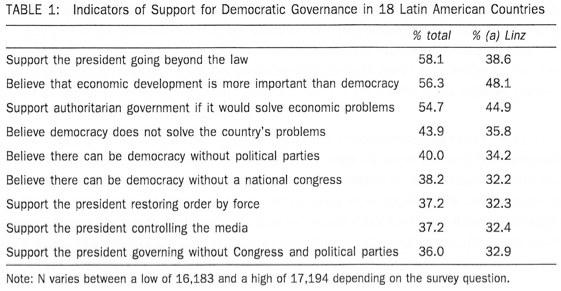Featured Article:Public Opinion, Democracy, and the Economy: Case Studies from the Southern Cone
By
2012, Vol. 4 No. 08 | pg. 1/3 | »
IN THIS ARTICLE
KEYWORDS
AbstractUtilizing 2009 data from the Latinobarómetro public opinion survey and bivariate statistical methods, this study assesses the degree to which respondents’ evaluations of both national economic conditions and their personal economic conditions are associated with their overt and intrinsic support for democracy in Argentina, Chile, Paraguay, and Uruguay. This study finds that the three overt support for democracy variables employed in this analysis were highly volatile, both when compared among themselves and when compared across the countries sampled. The five intrinsic support variables also had substantial variations in degrees of association across all four countries. Most of the overt and intrinsic support variables were only weakly associated with respondents’ economic evaluations, with some (namely life satisfaction) demonstrating moderate levels of association. This study also finds that when aggregated together, the intrinsic support measures more consistently reduce error in predicting respondents’ evaluations of economic conditions than do the overt support measures, although their degree of association with the economic variables is not necessarily stronger. The findings of this study corroborate the “lip-service” to democracy effect and carry important implications for the future of democratic consolidation in the region, particularly from a political culture perspective. Additionally, as the first study focusing on the Southern Cone specifically, the results herein will also provide grounds for future sub-regional comparisons within Latin America, and the more current data used in this study provides a useful point of comparison for past studies utilizing data from previous years, even despite methodological differences. Lastly, this study’s use of both overt and intrinsic support for democracy supplements previous studies that have focused on the same (or a similar) research question, but that have done so solely through the employment of measures of overt support for democracy.Democracy is without question one of the most frequently studied topics in the discipline of political science, but its salience is not limited to academia alone. Indeed, the popularity of democracy among world publics continues to rise, as does the prevalence of democratic transition and consolidation in what were previously authoritarian regimes. Of course, what exactly brings about democracy, consolidates it, and enhances its overall quality is highly contested. Nevertheless, a persuasive body of literature since the 1950s has posited that the transition and consolidation of democracy is brought about, at least in part, by economic development. Latin America is among the most frequently studied regions in which this phenomenon has been examined. Indeed, it is difficult to find political science literature on the region that does not in some way or another deal with the theme of democracy and/or economic development. The surge of “third wave” democratization throughout the region in the 1980s has provoked the rise of an immense body of literature that looks to examine this transition, its potential for consolidation, and the quality of democracy experienced in the region. However, for those who emphasize economic development as an important component of democracy, Latin America would, at least superficially, not appear to be the most hospitable region to democratic consolidation. A 2004 UN report expressed concern for the consolidation of democracy in Latin America given the region’s long, persistent history of poverty and inequality (Carlin 2006). Similarly, results from a 2008 AmericasBarometer survey conducted by the Latin American Public Opinion Project (LAPOP) showed that the current economic crisis may weaken support for democracy in the region, although other scholars were more optimistic that democracy would “weather the storm” (Allen 2009). Using 2009 public opinion data from Latinobarómetro1, this study employs use of the bivariate statistic gamma (G) in order to provide an in-depth, variable-by-variable look at measures of public support for democracy and their correlation to public evaluations of economic conditions in four Southern Cone countries (Argentina, Chile, Paraguay, and Uruguay). While not as sophisticated as the multiple regression analyses and other comprehensive statistical modeling conducted by other scholars on this and similar topics, the bivariate analyses used in this study do provide an informed assessment of associations between public opinion on democracy and the economy, and as the first study focusing on the Southern Cone specifically, the results herein will also provide grounds for future sub-regional comparisons within Latin America. Furthermore, the more current data used in this study will provide a useful point of comparison for past studies utilizing data from previous years, even despite methodological differences. The first section of this paper reviews the literature on democracy and its relationship to the economy, emphasizing studies that have focused on a public opinion approach to measuring this relationship. The second section explains the data sources, variables, and methods used in this study, and the third section presents the results of the bivariate statistical analysis. The fourth section provides a discussion as to the meaning and importance of these results, and the final section concludes by summarizing the principal findings of this study. A Review of the LiteratureThe literature on democracy and its relationship with economic conditions is vast and methodologically diverse. Lipset (1959) is credited with first establishing this research agenda by proposing a theoretical link between a country’s level of development and its likelihood of being democratic. He confirmed this hypothesis empirically in his study (Wucherpfennig and Deutsch 2009), later positing that “all the various aspects of economic development—industrialization, urbanization, wealth, and education—are so closely interrelated as to form one major factor which has the political correlate of democracy” (Lipset 1960: 41). In fact, Lipset’s 1959 article ranks as one of the top-ten citations of the American Political Science Review of all time (Siegelman 2006). Referred to in the literature as modernization theory, research in this arena has contributed a vast number of empirical tests that have aimed at discovering the extent to which economic development affects the development, consolidation, and/or quality of a country’s democracy2. Research within modernization theory has generally not been concerned with measuring public opinion in the economic realm, likely because such a measurement is not conducive to some of the variables typically measured under this theory (industrialization, urbanization rates, etc.). Nevertheless, as research programs have continued to branch out, develop, and deviate from the original questions posed by modernization theory, more recent studies have examined public support for democracy and its relationship with actual economic conditions. Focusing on Latin America, Carlin (2006) found that socioeconomic context and status (measured using indicators for economic development, inequality, and poverty rates) affected Latin Americans’ support for democracy. As Carlin correctly notes, these results are important because theorists operating within the political culture paradigm have long argued that support for democracy is related to the quality of democracy through civil society and the citizen action it promotes. He also highlights that lack of support for democracy “may be related to the rise of populism or ‘neo-populism’ which has damaged the quality of democracy in the post-authoritarian era” (Carlin 2006: 51). However, measuring support for democracy is not as straightforward is it may appear at first glance. Inglehart and Welzel (2003) argue that measures of overt support for democracy are not indicative of actual support for democracy itself due to the fact that democracy has become popular to the extent that individuals pay “lip-service” to it without actually supporting the underlying political culture values that such support intends to measure. Figure 1 clearly illustrates the discord that occurs between measures of overt support and underlying values.
Figure 1. Source: Cited and translated by Carlin (2006: 56) from UNDP (2004: 137). Data from Latinobarómetro 2002.
%(a) Linz refers to the percentage of respondents agreeing with choice A of the Linz question (below) and answering positively to the above democratic governance indicators. Which of the following statements do you agree with most? As the above table notes, for example, 38.6% of those who stated that democracy was preferable to any other kind of government also stated that they would support the president going beyond the law. This clearly indicates a discord between overt support for democracy and support for underlying ideals associated with it, and therefore illustrates the “lip-service” to democracy effect. Instead, Inglehart and Welzel use what they term “self-expression values,” which are identified as liberty and participation, public self-expression, tolerance of diversity, interpersonal trust, and life satisfaction. Their study, spanning across all world regions, found that overt support for democracy added nothing to the effect of self-expression values on effective democracy3. A subsequent 2006 study by the same scholars corroborated these findings, noting additionally that societies that rank high on one self-expression value tend to rank highly on all them, and vice versa (Inglehart and Welzel 2006). They note that insofar as economic development brings about rising levels of these self-expression values, the result will lead to greater demands for democracy. This is due to economic development’s tendency to shift societal values from those emphasizing basic survival, to those emphasizing self-expression (ibid). Carlin’s (2006) previously mentioned study incorporated Inglehart and Welzel’s distinction between overt support versus intrinsic support of democracy (the latter measured by the aforementioned self-expression values), and found that economic development fostered intrinsic support for democracy while inequality and poverty had negative effects on overt support. His results also suggest that more educated and wealthy individuals were more likely to support democracy and the self-expression values than less educated or less wealthy individuals. These studies have contributed a wealth of knowledge to the study of economic development and its empirical relationship to democracy. What is important to note, however, is that none of these studies focused solely on the realm of public opinion. In the case of the Inglehart and Welzel studies, for example, overt and intrinsic support for democracy (derived from public opinion) was compared with actual democracy index data (not public opinion). Similarly, Carlin’s study compared public opinion data on democratic support with actual economic development indicators such as inequality and poverty rates. Other studies (see for example Claassen and Mattes 2007) took similar approaches. Much fewer studies have attempted to compare public opinion in both realms simultaneously; that is, the relationship between public support for democracy and public evaluations of economic conditions. I believe this is an important relationship that merits greater attention. After all, public perception does not necessarily coincide with actual conditions. Therefore, while examining the relationship between public opinion (such as support for democracy) and actual economic conditions (such as inequality, poverty, industrialization rates, etc.) does provide significant insight on the relationship that democratic culture may have on economic development (and consequently democratization), it does not examine the relationship among public perceptions themselves, a relationship that may drive respondents’ evaluations of democracy and the economy. That is, by focusing solely on public opinion in these two realms, it is possible to examine how perceptions of one may be affected by perceptions of the other, an inquiry that studies based wholly or partially on actual democratic or economic conditions cannot accomplish. Of course, my study is not the first to attempt such an analysis. Indeed, various scholars have undertaken such studies, with varied results. Przeworski (1991) found that as citizens’ perceptions of improvement of their personal and the national economic situation increases, so does their support for democracy. Dalton (1994) also found this same relationship when examining citizens’ evaluations of the national economy and their support for democracy in East Germany. Numerous other studies, however, have found that there is little linkage between these two variables when other factors are controlled for4. One interesting example is Lagos’ (2003) study focusing on Latin America, which found that support for democracy as a system increased even as satisfaction with market-based policies and actual current government decreased. As Lagos notes, this surprising find is actually quite promising; it means that Latin Americans are learning to distinguish between democracy as a system and specific democratically elected governments. That is, not supporting the latter does not connote lack of support for the former. Given the relatively nascent nature of “third wave” democracy throughout the entire region, this finding appears to indicate promising signs for democratic consolidation. Graham and Sukhtankar (2004) corroborated these findings. Both of these studies used data from the first years of the 21st century, a time when much of the region underwent severe economic crises (Argentina in particular). It would therefore be informative to examine whether or not such a promising finding has continued even after weathering these severe crises. A global study by Chu et al. (2008) found “no linear relationship between people’s perception of current economic conditions and the extent to which publics believe that democracy is the best form of government for their society” (78), except in East Asia. Shyu (2007) conducted an analysis of seven Asian countries and found economic evaluations were not entirely absent of effect on support for democracy, but found that the political variables employed in the study were generally stronger predictors. It is important to note that both of these studies focused on measuring overt, rather than intrinsic support for democracy. Given Inglehart and Welzel’s previously mentioned data regarding popularity and “lip-service” to democracy, this lack of correlation is perhaps not surprising. Both included intervening variables measuring trust in political institutions and perceptions of political rights, but these variables more directly measure support for a particular regime rather than actual self-expression values. Therefore, while these findings may appear promising by demonstrating that publics are distinguishing between democracy as a system and actual democratic governments (through the economic development or lack thereof that they provide), they do not test the permeation of self-expression values that the previously mentioned political culture theorists (for example, Inglehart and Welzel) have found are important for a thriving democracy. My study is therefore an attempt to bridge this gap. I examine the relationship between public support of democracy (overt and intrinsic) and respondents’ evaluations of the economy, both sociotropically (that is, a respondent’s evaluation of the national economy) and from a “pocketbook” stance (that is, a respondent’s evaluation of their personal economic condition). Additionally, this study’s use of more current data (from 2009) will provide a point of comparison with previous studies that have utilized data from earlier years, even despite methodological and country selection differences. My study’s focus on the Southern Cone region of Latin America (Argentina, Chile, Paraguay, and Uruguay) contributes to the literature on public opinion and support for democracy and economic conditions in that no study to my knowledge has focused explicitly on this sub-region. Most often, analyses have been either global in nature or, in the case of Latin America, have focused on the entire region. However, the Southern Cone is unique in Latin America in a variety of ways. At a very general level and despite notable exceptions, Argentina, Chile, and Uruguay benefit from the largest middle classes in Latin America, the greatest level of human development, high economic growth, and (along with Costa Rica) rank highest in Latin America on democracy indices. Given their uniqueness in the region, I believe these Southern Cone countries merit a more in-depth look at how public perceptions of the economy are associated with support for democracy. Paraguay, however, does not rank highly on any of these indicators, and is therefore included to provide a comparative perspective.Continued on Next Page » Suggested Reading from Inquiries Journal
Inquiries Journal provides undergraduate and graduate students around the world a platform for the wide dissemination of academic work over a range of core disciplines. Representing the work of students from hundreds of institutions around the globe, Inquiries Journal's large database of academic articles is completely free. Learn more | Blog | Submit Latest in Political Science |

















